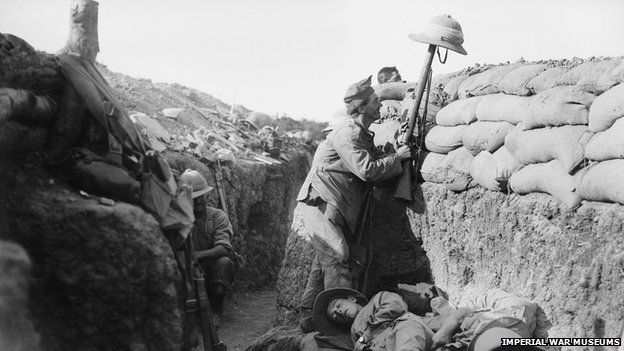WW1: Descendants remember Gallipoli campaign
- Published

As the 100th anniversary of the start of WW1's Gallipoli campaign approaches, descendants of those who fought are being urged to join the official commemorations in London.
At dawn on April 25th 1915, Allied troops invaded the Gallipoli Peninsula in Ottoman Turkey. The ultimate aim was to force the Ottoman Empire out of the war. The invasion failed. A bloody stalemate lasted until Allied troops evacuated the peninsula in January 1916.
"It was a humiliating defeat," said Paul Cornish, a senior curator at Imperial War Museums.
Conditions were dreadful. Over the course of the campaign the weather swung from stiflingly hot to bitterly cold.
"There were flies and disease," said Mr Cornish. "There were terrible problems with dysentery and things like jaundice. Eventually there were blizzards and ice that were causing a lot of frostbite. It wasn't a very nice place to be at all."
Some 57,000 Allied troops lost their lives during the campaign. One of them was L/Cpl Archibald Macleod from 7th Battalion, Manchester Regiment. He died aged 27 and is buried at Lancashire Landing Cemetery in Turkey.
L/Cpl MacLeod's great-grandson Dean Emsley, from Battersea, is one of the descendants who will attend April's commemoration at the Cenotaph in Whitehall.
"He wrote a letter to my granddad in April 1915," said Mr Emsley. "He deployed to Gallipoli on the 6th of May… he died of wounds on 27 May."
The letter, sent from Atbara in Sudan, read:
My Dear Ronnie,
We are not fighting the Germans here, we are just seeing that the Germans do not
get the people here to fight against King George.
Be a good lad. Do what your mother and your teacher at school tell you to do.
Always help your mother.
Never cry even if your hands are cold.
I'm going to bring you home a little CROCODILE.
Your loving Dad.
"My assumption is that he knew he was deploying to a war-zone," said Mr Emsley. "This was probably his last chance to write a letter to his little boy who was seven years old. It was actually his seventh birthday when the letter was written."
Mr Emsley is a former serviceman himself.
"I was involved in the war in Bosnia first of all and a little bit later in Gulf War number one, so I have an idea how he was feeling," he said.
British troops made up the majority of Allied casualties at Gallipoli but the campaign has become synonymous with Australia and New Zealand.
"It was their first taste of action in the war," said Mr Cornish. "They lost over 11,000 killed at Gallipoli, which is a shocking figure in the context of the relatively small populations of Australia and New Zealand at the time."
Approximately 90,000 Ottoman Empire troops were also killed during the campaign. With a significant Turkish population in London that is something now being acknowledged in classrooms.
"It was a great victory for the Turks," said Mr Cornish. "From what I've noticed in schools in London, Turkish children are well aware of it because it was where the leader of their national reinvention, Ataturk, made his first impact. It is very important."
The National Commemoration of Gallipoli will take place at the Cenotaph on 25 April. The event will follow the annual Anzac Day Dawn Service at the Australian War Memorial and New Zealand Memorial at Hyde Park corner.
Helen Grant MP is the minister responsible for the government's World War One commemorations. "Gallipoli is a very important campaign," she said. "We want to commemorate it and we want to do it very well."
The event will comprise a service, the laying of wreaths by senior members of the military and international governments and a march past the Cenotaph.
Registration for the event finished on Thursday.
For L/Cpl MacLeod's great-grandson it will be a unique experience.
"It's 100 years since it happened," Mr Emsley said.
"It will probably be the largest remembrance opportunity… I've never been to one of the November Remembrance Day parades.
"I've got my great-granddad's medals and I'll dig out my own medals. There will be a sense of pride, but more a sense of loss. Here was a young guy who could have had a full life."
- Published15 February 2015
- Published8 February 2015
- Published2 April 2014